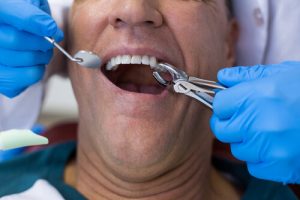Have you ever experienced an alarming situation where a tooth broke while flossing? It can be distressing, leaving you wondering about the causes and what steps to take next. In this article, we’ll explore why teeth can break during flossing, discuss preventive measures, and discuss the available treatment options. So, if you’ve encountered this dental dilemma, fret not! We’re here to unravel the mystery and guide you through the best course of action.
Common Causes of Teeth Breaking While Flossing
Experiencing a tooth breaking while flossing can be alarming and may leave you wondering why it happened. Understanding the underlying causes can provide insight into this incident and guide you towards appropriate dental care.
1. Poor Oral Hygiene: Inadequate brushing and flossing habits can lead to the accumulation of plaque and tartar, weakening the tooth’s enamel and making it more susceptible to chipping or breaking.
2. Tooth Decay: Untreated tooth decay can cause structural weakness in the tooth, making it more prone to breakage, especially when a cracked tooth is subjected to pressure during flossing.
3. Trauma: Physical trauma or injury to the tooth, whether from accidents, grinding/clenching habits, or biting hard objects, can cause tooth chips, cracks, or fractures.
4. Dental Fillings: Old or improperly placed dental fillings may weaken the tooth’s structure, increasing the risk of breakage, particularly if they become loose or dislodged while flossing.
5. Enamel Wear: Chronic teeth grinding (bruxism) or habitual consumption of acidic foods and beverages can wear down the tooth’s enamel, making it more susceptible to damage.
6. Dental Complications: Underlying dental issues such as gum disease, root canal infections, or weakened tooth nerves can compromise the tooth’s integrity and lead to breakage during routine oral hygiene practices like flossing.
Preventive Measures: Tips to Avoid Tooth Breakage During Flossing
Preventing tooth breakage during flossing is paramount for maintaining dental health and avoiding potential complications. By implementing preventive measures and proper flossing techniques, individuals can reduce the risk of experiencing tooth breakage and safeguard their oral well-being.
1. Regular Dental Check-ups: Schedule routine dental check-ups to identify and address any underlying dental issues, such as tooth decay or gum disease that may increase the risk of tooth breakage during flossing.
2. Practice Gentle Flossing: Use gentle, back-and-forth motions to guide the floss between teeth, avoiding excessive force or aggressive movements that may inadvertently lead to tooth breakage.
3. Choose the Right Floss: Select comfortable and suitable floss for your teeth, such as waxed or glide floss, to minimise the risk of snagging or shredding that could cause tooth breakage.
4. Maintain Good Oral Hygiene: Brush teeth twice daily with fluoride toothpaste and floss at least once daily to remove plaque and food debris. This reduces the likelihood of tooth decay and weakens tooth structure.
5. Avoid Teeth Grinding: Wear a mouthguard at night if you grind your teeth while sleeping. Chronic teeth grinding (bruxism) can weaken tooth enamel and increase susceptibility to breakage during flossing.
6. Address Dental Issues Promptly: Seek prompt treatment for any dental concerns, such as chipped teeth or loose fillings, to prevent further tooth damage and reduce the risk of tooth breakage during flossing.
What to Do If Your Tooth Breaks While Flossing: Immediate Steps
 Encountering a broken tooth while flossing can be alarming, but knowing the immediate steps can help alleviate discomfort and prevent further damage. Here, we outline what to do if your tooth breaks while flossing and offer guidance on handling and treating the situation effectively.
Encountering a broken tooth while flossing can be alarming, but knowing the immediate steps can help alleviate discomfort and prevent further damage. Here, we outline what to do if your tooth breaks while flossing and offer guidance on handling and treating the situation effectively.
Remain Calm:
Stay composed and avoid panicking if your tooth breaks while flossing. Take a deep breath and assess the situation calmly to determine the extent of the damage.
Rinse Your Mouth:
Rinse your mouth with warm water to remove blood or debris and alleviate discomfort. Avoid using mouthwash containing alcohol, as it may irritate.
Apply Pressure:
In the event of bleeding, gently apply pressure to the affected area using a clean gauze or cloth to help manage the bleeding. Keep the pressure for a few minutes until the bleeding diminishes.
Save the Tooth Fragment:
If a portion of the tooth has broken off, carefully retrieve it and place it in a clean container filled with milk or saline solution. This may preserve the fragment and facilitate potential reattachment by your dentist.
Contact Your Dentist:
Contact your dentist as soon as possible to seek prompt dental care. Provide details of the incident and schedule an emergency appointment to assess the damage and determine the appropriate course of action.
Manage Discomfort:
Take over-the-counter pain relievers such as acetaminophen or ibuprofen to alleviate discomfort or swelling. Avoid aspirin, as it may increase bleeding.
Seeking Professional Help: Treatment Options for Broken Teeth
 When a tooth breaks, seeking professional dental help is paramount to effectively addressing the issue and preventing complications. This section discusses the treatment options available for broken teeth, providing insights into the steps necessary to restore dental health and functionality.
When a tooth breaks, seeking professional dental help is paramount to effectively addressing the issue and preventing complications. This section discusses the treatment options available for broken teeth, providing insights into the steps necessary to restore dental health and functionality.
Dental Bonding
Dental bonding might be suggested for minor fractures or chips. This process entails the application of a tooth-coloured resin to the affected area, which is then shaped and hardened to restore the tooth’s form and aesthetics.
Dental Crowns
Moderate to severe tooth fractures may require dental crowns for strength and protection. Crowns are custom-made caps that cover the entire tooth, restoring its structure and function while enhancing aesthetics.
Root Canal Therapy
If the fracture extends into the tooth’s pulp chamber, root canal therapy may be necessary to remove infected or damaged tissue. This procedure involves cleaning, disinfecting, and sealing the damaged tooth part’s inner chambers to prevent further infection and preserve the tooth.
Dental Implants
In cases where a broken tooth cannot be salvaged, dental implants may be considered a permanent replacement option. Implants involve surgically placing artificial tooth roots into the jawbone, onto which a dental crown is attached, providing a durable and natural-looking restoration.
Dental Veneers
Dental veneers may be an option for cosmetic concerns associated with healthy teeth with minor fractures or chips. These thin shells of porcelain or composite resin are bonded to the tooth’s front surface to improve its appearance and conceal imperfections.
Extraction
Extraction may be necessary to prevent infection and preserve oral health in severe damage or decay where the tooth cannot be saved. Your dentist will assess the situation and recommend the most appropriate treatment option based on the extent of the fracture and your individual needs.
Long-Term Dental Care: Ensuring Oral Health After a Tooth Breaks While Flossing
 Maintaining long-term dental care is essential for preserving oral health, especially after experiencing a tooth break while flossing. In this section, we delve into the importance of ongoing oral hygiene practices and professional dental visits to ensure the health and longevity of your teeth.
Maintaining long-term dental care is essential for preserving oral health, especially after experiencing a tooth break while flossing. In this section, we delve into the importance of ongoing oral hygiene practices and professional dental visits to ensure the health and longevity of your teeth.
Regular Dental Check-Ups:
Schedule regular dental check-ups with your dentist to monitor the condition of your teeth and address any issues promptly. These routine visits allow your dentist to detect any signs of dental problems early on and provide preventive care to mitigate potential risks.
Consistent Oral Hygiene:
Maintain a consistent oral hygiene routine by brushing your teeth twice daily with fluoride toothpaste and flossing at least once daily. Maintaining proper oral hygiene is essential for eliminating plaque and food debris from the teeth and gum line. This practice significantly lowers the likelihood of developing decay and gum disease.
Avoiding Habits That Can Damage Teeth:
Avoid habits such as nail-biting, chewing on ice or hard objects, and using teeth as tools, as they can increase the risk of tooth fractures and damage. Protect your teeth by refraining from activities that put unnecessary strain on them.
Using Protective Mouthguards:
If you participate in sports or activities that pose a risk of dental injury, consider using a custom-fitted mouthguard to protect your teeth from impact. Mouthguards help the body absorb and distribute forces that could otherwise cause tooth fractures or dislodgement.
Seeking Prompt Dental Care:
If you experience dental pain or sensitivity or notice changes in your oral health, seek prompt dental care. Delaying treatment can exacerbate the problem and lead to further complications, so it’s essential to address concerns as soon as they arise.
In conclusion, a tooth breaking while flossing can be alarming, but it’s essential to remain calm and take appropriate steps. Seeking prompt dental care is crucial to effectively address the issue and prevent further complications. Remember, your dentist guides you through this dental concern and ensures your oral health is restored.
If you’ve experienced a tooth breaking while flossing, don’t hesitate to contact us for immediate assistance—call (08) 9783 9006 to schedule an appointment with our experienced Emergency Dentist in Perth. Your dental health is our priority; we’re here to provide you with the care and support you need.
References
Why should I use dental floss? – NHS
https://www.nhs.uk/common-health-questions/dental-health/why-should-i-use-dental-floss/#:~:text=Flossing%20tips&text=Use%20a%20gentle%20%22rocking%22%20motion,the%20floss%20against%20the%20tooth.
How to Floss Properly: Step-by-Step Guide to Flossing Teeth
https://www.healthline.com/health/how-to-floss
How to Floss | Flossing Techniques
https://www.colgate.com/en-us/oral-health/brushing-and-flossing/flossing-how-to
Importance of Flossing | University of Illinois Chicago
https://dentistry.uic.edu/news-stories/importance-of-flossing/
How to Floss Your Teeth Properly
https://www.news-medical.net/health/How-to-Floss-Your-Teeth-Properly.aspx


Recent Comments